
Rice is typically right at the top of the list of healthy diet staples. Unfortunately, depending on the kind you eat and how your body handles it, rice can cause a flare-up of bloating, gas or even diarrhea — especially if you have irritable bowel syndrome or another gastrointestinal issue.
Brown Rice vs. White Rice
Video of the Day
Brown rice is often recommended by health professionals because it's less processed than white rice. "It contains the bran, the nutritious germ and a lot of nutritional value, like vitamins and minerals," says Niket Sonpal, MD, gastroenterologist at Brookdale University Hospital Medical Center in Brooklyn, New York. It's also loaded with fiber and protein. White rice, on the other hand, has been milled to remove the bran and germ, which in turn strips away most of its benefits. Because of their differences, the way each type of rice affects you may vary.
Video of the Day
Read more: Which Rice is Healthiest?
Why Rice Can Cause Bloating
While the high amount of fiber in brown rice can benefit your health, it can also cause some discomfort. According to the Cleveland Clinic, fiber has been shown to help reduce your risk for heart disease, diabetes and certain types of cancer. However, a lot of fiber at one sitting, especially if you're not used to it, can cause gas, bloating, diarrhea or cramping as your gut system can't keep up with the demand to digest it, according to Harvard Health Publishing.
"It can cause indigestion, as the fiber can slow digestion and cause bloating," says Linda Anegawa, MD, a telemedicine physician with PlushCare. "This is particularly true for those with irritable bowel syndrome."
It's important to note, though, that it's not just rice: All grains have the potential to affect your digestion in this way.
"The ingestion of any starch, including brown or white rice, triggers the release of insulin," Dr. Anegawa says. "Chronic overconsumption of too much grain, even what are felt to be 'healthy' grains such as brown rice, can cause chronic hyperinsulinemia in certain individuals. These abnormally high levels of insulin lead to increased fat deposition deep inside the belly around the organs, also known as visceral fat. Over time, visceral fat accumulation can cause many gastrointestinal issues, including bloating, diarrhea or constipation and excess gassiness."
Read more: What Vegetables Can I Eat With IBS?
Bloating Prevention
If you're experiencing bloating or other issues after eating rice, try keeping a food journal that includes what you eat, when and how much, as well as any symptoms.
"This can be the best way to help identify trigger foods, as well as see if you can tolerate a smaller portion of the food," says Erin Palinski-Wade, RD, a New Jersey-based registered dietitian. "You can also start small. Some people can eat brown rice in half-cup portions with no issues — they only experience bloat when eating larger volumes. That's why I recommend adding fibrous foods to your diet slowly."
A food diary is key if you have irritable bowel syndrome (IBS), as it can be tricky to increase the amount of fiber in your diet without stressing out your system. "It's possible to find a happy medium," Dr. Sonpal says. "A food diary will show you which fiber-containing foods won't exacerbate bloat symptoms or pain."
This is when white rice can come in handy. "Because it has under 1 gram of fiber, it won't typically upset the stomach," he says. "But remember, rice in general is starchy, so it can still cause a reaction."
Dr. Anegawa recommends pairing rice with protein or fat, as it helps combat the insulin spike that can occur when eating starches. You can also switch to grain-free rice alternatives, like riced cauliflower or broccoli.
Try to drink more fluid when eating fiber and eat more slowly, making sure to chew your food well, too. "This can help prevent swallowing excessive air, which increases bloat," Palinski-Wade says. "It also helps break down food in the mouth to make the digestive process in the gut even easier."
At the end of the day, it might take some trial and error to figure out what works best for you, but by taking those extra steps, you'll be able to eat rice and feel great while doing so.
- Niket Sonpal, MD, gastroenterologist, Brookdale University Hospital Medical Center, Brooklyn, New York
- Cleveland Clinic: “11 Best High-Fiber Foods”
- Harvard Medical School: “How to Get More Fiber in Your Diet.”
- Linda Anegawa, MD, telemedicine physician, PlushCare
- Erin Palinski-Wade, RD, CDCES, LDN, CPT, registered dietitian, New Jersey
Is this an emergency? If you are experiencing serious medical symptoms, please see the National Library of Medicine’s list of signs you need emergency medical attention or call 911.